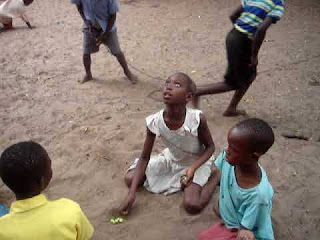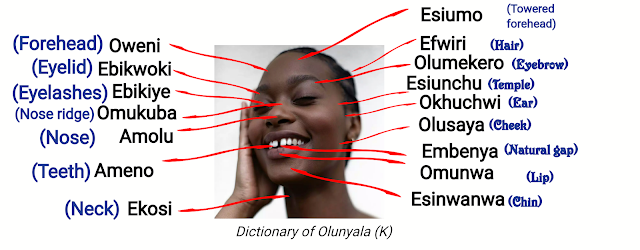ABANYALA BA KAKAMEGA: PRONOUNS 2- EMPHATIC PRONOUNS
A] What are emphatic pronouns?
Emphatic pronouns are pronouns that are used to show emphasis. They are also called intensive pronouns. For example:
Witches themselves bewitched dogs.
- Abalosi abachana baloka embwa.
- Abalosi abaenebaene baloka embwa.
In the above sentence, themselves in sentence (a) is an emphatic pronoun. In the Olunyala (K) translation of sentence (1) the word abachana is an emphatic pronoun. In the Olunyala (K) translation (2), abeenebene is a synonymous emphatic pronoun.
Emphatic pronouns are articulated with word stress than the neibouring words to bring out the emphasis.
B] Which is the position of emphatic pronouns?
They are usually placed after the noun or pronoun they intensify or emphasise. However, they can precede the noun for stronger emphasis.
i) Efwe efwefwe sikhulianga emondo.
ii) Efwefwe efwe sikhulianga emondo
In sentence (i), the emphatic pronoun efwefwe comes after the pronoun efwe. In sentence (ii), the emphatic pronoun efwefwe comes before the pronoun efwe.
C] How are emphatic pronouns in Olunyala (K) formed?
Emphatic pronouns formed by doubling Personal Pronouns for human.
- I/me as ese lgives esese
- Balovera esese endi okhukhupa Okava
- Wuchunju ali okhukhupa ese esese.
- We/us as efwe gives efweefwe
- Abasacha efwefwe khuli okhukhupa Masika.
- Nyikuri ali okhukhupa efwe efwefwe.
- You as ewe gives eweewe
- Omuana ewewe oli okhukhupa Namunyu.
- Matang’u ali okhukhupa ewe ewewe.
- You as enywe/emwe gives enyeenywe
- Enywenywe abana muli okhukhupa Mukhiyi.
- Malekhe ali okhukhupa abana enywenywe.
- He/she/him/her uses niye
- Omusacha niyeniye ali okhukhupa Okwamo.
- Sikonyi ali okhukhupa niyeniye omusacha.
- It/they/them- they take the noun-concord prefix of the class into which the human falls; normal, belittled and good, belittled and bad, made big e.t.c
- Abakhasi nibonibo bali okhukhupa Wawire.
- Wandiri ali okhukhupa abakhasi nibonibo.
- Akhakhasi nikhonikhokha Mwombe?
- Ochukhasi nichwonichwo chwa Liwa.
- Esisieno sinosino sili okhukhupa Khabasi.
- Nambale ali okhukhupa emiana kinokino.
- Aonda ali okhukhupa esikhana nisionisio.
- Ayuki ali okhukhupa okuana nikwo.
Emphatic pronouns formed by doubling the Reflexive Pronoun
- The reflexive pronoun esesamuene for myself- it becomes esesamuenemuene.
- Namwikami samuenemuene endi okhulia.
- The reflexive pronoun wuamuene for yourself- it becomes wuamuenemwene.
- OYyueri wuamuenemuene oli okhulia.
- The reflexive pronoun mwabene for yourselves- it becomes mwabenebene.
- Abatabani mwabenebene muli okhulia.
- The reflexive pronoun fwabene for ourselves- it becomes fwabenebene.
- Efwe fwabenebene khuli okhulia.
Emphatic pronouns formed by doubling the various forms of itself/themselves.
- O-ABA
- Omulosi omuenemuene akwiiye.
- Abalosi abakwiye abaenebaene.
- OCHU-EBI
- Ochukhutu ochuenechuene chukwiye.
- Ebikhutu ebienebiene bikwiye.
- AKHA-OCHU
- Akhachwe akhaenekhene khakwiye.
- Ochuchwe ochuenechuene chukwiye.
- OKU-EKI
- Okueyo okuenekuene kukwiye.
- Emieyo ekienekiene kikwiye.
- ELI-AKA
- Ekeko elieneliene likwiye.
- Amakeko akaenekaene akakwiye.
- EYI-ECHI
- Eng’ombe iyieneyiene yikwiye.
- Engombe echienechiene chikwiye
- ESI-EBI
- Esisero esienesiene sikwiye.
- Ebisero ebienebiene bikwiye.
- OLU-OWU
- Oluoya olueneluene lukwiye.
- Owuoya owuenewuene wukwiye.
- OLU-ECHI
- Olufuyiro olueneluene lukwiye.
- Efuyiro echienechiene chikwiye.
- OKHU-OKHU
- Khumukongo okhuenekhuene khukwiye.
- Khumikongo okhuenekhuene khukwiye.
- AHA-AHA
- Ahalukongo ahaenehaene hakwiye.
- Ahangongo ahaenehaene hakwiye.
- OMU-OMU
- Mukhuchwi omuenemuene mukwiye.
- Mumachwi omuenemuene mukwiye.
- AKA-AKA
- Amasika akaenekaene kakwiye.
- Amasika akaenekaene kakwiye.
- ELI-ELI
- Ekhwe elieneliene likwiye.
- Ekhwe elieneliene elikwiye.
- OLU-OLU
- Olusolili olueneluene lukwiye.
- Olusolili olueneluene lukwiye.
- OWU-OWU
- Owusie owuenewuene wukwiye
- Owusie owuenewuene wukwiye.
At times, the phrase ene n’…ene is used. The following examples show this.
- Ochukhutu ochuene n’ochuene chukwiye.
- Ebikhutu ebiene n’ebiene bikwiye.
- Eng’ombe eng’ene n’eng’ene yikwiye.
- Engombe echiene n’echiene chikwiye
Emphatic pronouns formed from the Emphatic Pronoun Root ~achana.
The Emphatic Pronoun Root (EPR) ~achana takes specific class-marked noun concord prefixes to form different emphatic pronouns for nouns in different word classes.
They are of two categories
Formed from each of the personal pronouns referring to people.
- I/me- ese
- Olunga esechana endi okhukhupa Wutola.
- Sumu ali okhukhupa Olunga esechana.
- We/us- efwe
- Abasolili efwechana khuli okhukhupa Kaula.
- Tavata ali okhukhupa abasolili efwechana.
- You- ewe
- Maloba eweachana ali okhukhupa Mukwe.
- Ongacho ali okhukhupa Mauko ewechana.
- You- enywe/emwe
- Abasangi enywechana muli okhukhupa Namulanda.
- Nandako ali okhukhupa enywe enywechana.
- He/she/him/her- niye
- Omukhana owachana ali okhukhupa Mupalia.
- Balongo ali okhukhupa omusolili owachana.
- It/they/them- they take the noun-concord prefix of the class into which the human falls; normal, belittled and good, belittled and bad, made big etc
- Abasiere ab’achana bali okhukhupa Wawuyube.
- Makhindu ali okhukhupa abasakhulu ab’achana.
- Esiana esiachana sili okhukhupa Sikumo.(esisieno)
- Kalifano ali okhukhupa esikhasi esiachana.
- Non-human represented by it/them/they- nouns from various classes form emphatic pronouns by using –chana as hereunder:
- O-ABA
- Omulosi omuene mululu. Abalosi abaene balulu.
- OCHU-EBI
- Ochukhutu ochuachana achekha.
- Ebikhutu ebiachana bichekha.
- AKHA-OCHU
- Akhechukhulu akhachana khachekha.
- Ochuichukhulu ochuachana chuchekha.
- OKU-EKI
- Okueyo okuachana kusasasukhire.
- Emieyo ekiachana kisasasukhire.
- ELI-AKA
- Ekeko eliachana likhulikhire.
- Amakeko akaachana kakhulikhire.
- EYI-ECHI
- Eng’ombe iyiachana yomolola.
- Engombe echiachana chimolola.
- ESI-EBI
- Esisero esiachana siosukhire.
- Ebisero ebiachana biosukhire.
- OLU-OWU
- Oluoya oluachana lukhulikhire.
- Owuoya owuachana wukhulikhire.
- OLU-ECHI
- Olufuyiro oluachana lukhalikhire.
- Efuyiro echiachana chikhalikhire.
- OKHU-OKHU
- Khumukongo okhuachana khupukhire.
- Khumikongo okhuachana khupukhire.
- AHA-AHA
- Ahalukongo ahaachana halafuhire.
- Ahangongo ahaachana halafuhire.
- OMU-OMU
- Mukhuchwi omuachana mululire.
- Mumachwi omuachana mululire.
- AKA-AKA
- Amasika ak'achana kanyonyire.
- Amasika ak'achana kanyonyire.
- ELI-ELI
- Ekhwe eliachana liipakhure.
- Ekhwe eliachana liipakhire.
- OLU-OLU
- Olusolili oluachana lukhayire.
- Olusolili oluachana lukhayire.
- OWU-OWU
- Owusie owuachana wuitikhire.
- Owusie owuachana wuitikhire.
Emphatic pronouns formed by doubling demonstrative pronouns
These pronouns are the same as demonstrative pronouns. However, they have a special tone that distinguishes them from the demonstrative pronouns and make them become emphatic pronouns albeit with an aspect of ‘demonstrativeness’ in them. For example,
i) Omulosi ono mubi niye. [ónò]
ii) Omulosi onono mubi niye
i) Omulosi olokanga ono mubi niye. [ònó]
ii) Omulosi olokanga onono mubi niye.
The above sentences use tone to distinguish the demonstrative pronoun [ónò] in a (i) and (ii) from the emphatic pronoun [ònó] in b(i) and b(ii). As emphatic pronoun, they are said slowly with a fall-rise tone. In sentences b(i) and b(ii), the witch mentioned may not be around. The following is a comprehensive list of demonstratives pronouns that can be used as intensive ones.
- O-ABA
- Ono, onoono, oyu, oyuoyu, oyuo, oyuooyuo, ola and olaola. Eg Omulosi olokanga onono mubi.
- Bano, banobano, aba, ababa, abo, aboabo, bala and balabala. Eg. Abalosi abalokanga banobano babi.
- OCHU-EBI
- Chuno, chunochuno, ochu, ochouochu, ochuo, ochuochuo, chula and chulachula. Eg. Ochukhutu ochukendananga chuno chuange.
- Bino, binobino, ebi, ebiebi, ebio, ebioebio, bila and bilabila. Eg. Ebikhutu ebikendananga ebiebi biange.
- AKHA-OCHU
- Khano, khanokhano, akha, akhaakha, akho, akhoakho, khala and khalakhala. Eg. Akhakokho akhakendananga akhakha khakho?
- Chuno, chunochuno, ochu, ochuochu, ochuo, ochuoochuo, chula and chulachula. Eg. Ochukokho chukendakendananga chulachula chuchuo?
- OKU-EKI
- Kuno, kunokuno, oku, okuoku, okuo, okuookuo, kula and kulakula. Eg. Okueyo okuwakinganga okuoku kukwiye.
- Kino, kinokino, eki, ekieki, ekio, ekioekio, kila and kilakila. Eg Emieyo ekiwakinganga ekioekio kikwiye.
- ELI-AKA
- Lino, linolino, eli, elieli, elio, elioelio, lila and lilalila. Eg Ekeko elichunanga elieli lichuna.
- Kano, kanokano, aka, akaaka, ako, akoako, kala and kalalala. Eg. Amakeko akachunanga kalakala kako?
- EYI-ECHI
- Yino, yinoyino, eyi, eyieyi, eyio, eyioeyio, yila, and yoilayila. Eg. Eng’ombe iyialwananga eyioeyio yange.
- Chino, chinochino, echi, echiechi, echio, echioechio, chila and chilachila. Eg. Engombe echialwananga chilachila chiange.
- ESI-EBI
- Sino, sinosino, esi, esiesi, esio, esioesio, sila and silasila. Eg. Esisero sianyasanga esioesio basiikala?
- Bino, binobino, ebi, ebiebi, ebio, ebioebio, bila and bilabila. Eg. Ebisero ebianyasanga ebiebi bisinyasa?.
- OLU-OWU
- Luno, lunoluno, olu, oluolu, oluo, oluooluo, lula and lulalula. Eg. Oluoya lwakitukhanga oluolu lwamera? .
- Wuno, wunowuno, owu, owuowu, owuo, oeuoowuo, wula and wulawuka. Eg Owuoya owamamukhanga owo wamera?
- OLU-ECHI
- Luno, lunoluno, olu, oluolu, oluo, oluooluo, lula and lulaula. Eg Olufuyiro Olwafuwanga oluooluo lwange.
- Chino, chinochino, echi, echiechi, echio, echioechio, chila and chilachila. Eg Efuyiro achiakhalikhanga echioechio chiange..
- OKHU-OKHU
- Khuno, khunokhuno, okhu, okhuokhu, okhuo, okhuookhuo, khula and khulakhula. Eg Khumukongo okhuserukhanga khulakhula khahona?
- AHA-AHA
- Hano, hanohano, aha, ahaaha, aho, ahoaho, ahala and ahalahala. Eg. Ahalukongo ahababechanga ahoaho hakhumba?
- OMU-OMU
- Muno, munomuno, omu, omuomu, omuo, omuoomuo, mula and mulamula. Eg Mukhuchwi omuachunanga omuoomuo mahona.
- AKA-AKA
- Kano, kanokano, aka, akaaka, ako, akoako, kala and kalakala. Eg Amasika akalondanirenge akaaka kawa?
- ELI-ELI
- Lino, linolino, eli, elieli, elio, elioelio, lila and lilalila. Eg Ekhwe elialondokhanga lilalila liawa?
- OLU-OLU
- Luno, lunoluno, olu, oluolu, oluo, oluooluo, lula and lulalula. Eg Olusolili oluanyasanga lulalula luawa?
- OWU-OWU
- Wuno, wunowuno, owu, owuowu, owuo, owuoowuo, wula and wulawula. eg Owusie wawunyanga owuoowuo wuli?




Comments
Post a Comment